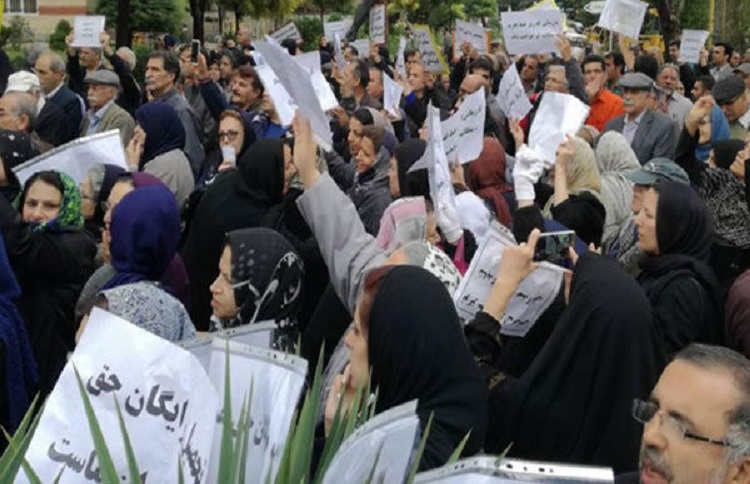
By Pooya Stone
Iranian teachers from various cities and provinces held a protest outside the Iranian parliament in Tehran on Monday to demand the cancellation of entrance exams for teaching universities.
Teachers in Literacy Movement, who is the group that organized the demonstration, said: “Given that we have been teaching for several years, and that some of our work as contract teachers, we should not have to worry about an entrance exam for the Teachers University.”
The teachers, who point out that the test has been waived for other groups (i.e. soldiers serving as teachers), have repeatedly contacted various officials, including parliamentarians, but there has been no response.
The teachers said: “There should not be discrimination against educators. The educators of this movement have worked for years, in remote and rural areas of the country, at the lowest wages. They deserve more attention.”
They held up signs with slogans like, “Elimination of the entrance exam is our inalienable right”.
One teacher told the state-run ILNA news agency: “While we have been teaching for years and a number of us here are working as part-time teachers in various schools, we should not be asked to give tests to prove our teaching abilities. We are demanding these tests be canceled and for us teachers to be allowed into teachers’ universities.”
Iranian teachers, roughly half of whom are women, have terrible living conditions, far below the world standard, because of the authorities’ failure to pay them fair wages, in full, and on time. Many of them have been teaching in remote villages.
Most teachers are classified as private contractors and earn below 1 million Tomans, which is about one-third of the wages of a formally employed teacher. Contract teachers face more challenging working conditions, are deprived of employment benefits, have no job security, and are overlooked.
In addition, teachers often aren’t paid their salaries until months after the fact and are being deprived of remuneration, overtime, insurance, and entitlements.
This makes it difficult to cope with life, which means that teachers would be worried about supporting themselves and their families when they should only be worried about the quality of their students’ education.
Active and retired teachers have taken part in over 200 sit-ins and protests during the 2019-2020 academic year.
Elsewhere in Iran, there were three other protests on Monday, including:
- 3,500 employees of a coal mine in Kerman
- Municipality workers in Ahvaz
- Employees of the National Iranian Drilling Company (NIDC) in Ahvaz
Read More:
Iranian Teacher’s Activist Sentenced to 16 Years in Prison Amid Coronavirus Crisis


